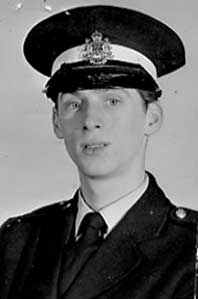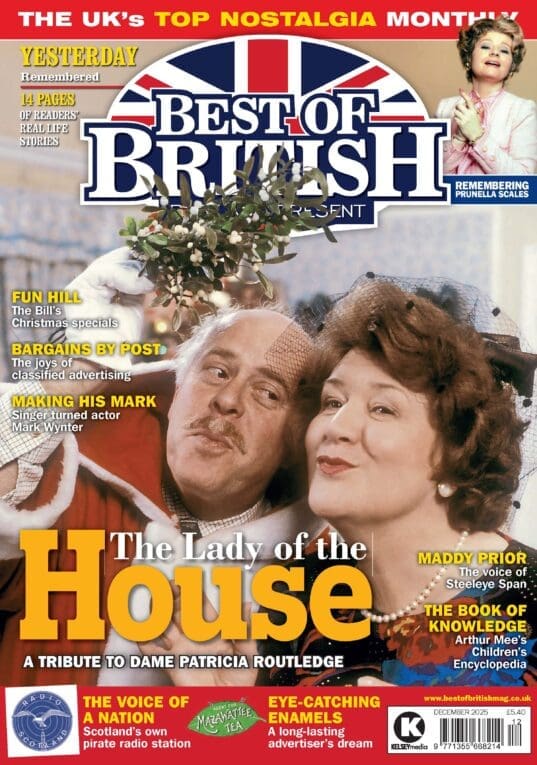Becoming a Sixties’ police cadet.

With secondary education behind me and five O Levels, I couldn’t wait to leave school at the age of 16. I could have stayed on but no, the world was a big place and I wanted to get out there and rampage through it.
The burning issue then became how I was to earn a living. It should be an easy decision; you simply picked a job and got on with it. It was then that I received my first shock – I hadn’t a clue what I wanted to do! As a child, my choice of career had often changed several times each day.
All the careers I had envisaged had a common hitch. They required some form of training. At the ripe old age of 16, I couldn’t see how I could spare several years in training that these careers demanded. No, I thought, life will pass me by while I’m doing all that studying.
Enjoy more Best of British Magazine reading every month.
Click here to subscribe & save.
As I mulled it over, it was impossible not to be influenced by my parents’ opinions. Running a small business, they knew the realities of making a living. They thought of banking as respectable and secure, so at their insistence I sat an entrance exam for the bank. I spent an hour answering arithmetical problems using an old wooden pen with attached nib and a bottle of ink. The questions were simple, as were the answers, and I got the impression that what would swing it for anyone sitting this examination would be the quality of his handwriting.
A week later I was informed that I had passed the exam, and was invited to an interview. By now, the thought of working in a bank didn’t appeal; if they were still writing with old fashioned pens, they were not the dynamic industry for an ambitious young man. I feared it would take at least seven or eight years to become the governor of the Bank of England!
While watching Z Cars on television one evening, my father remarked, “You know, a bobby gets a thousand quid a year nowadays.”
Even in my wildest imaginings, I had never considered the police force. As I thought about it, the idea grew. I saw myself swanning about in a Panda car, or solving crimes as an ace detective. The salary and pension didn’t concern me; just think of the excitement!
Within the week I completed the application form to become a police cadet and was invited to sit an entrance exam. Bristling with an array of pens, pencils, ruler and rubber, I entered the exam room with six other hopefuls. We were ushered in, seated at desks and handed examination papers by an officious looking sergeant.
The other invigilator was an inspector, who sat at a raised desk, observing the candidates with the imperious eye of an eagle. The sergeant treated the inspector with the deference normally reserved for a member of royalty. I thought, ‘this guy must be really important’. In the years that followed, I learned that the inspector certainly thought so.
The exam disappointed me as it could have been handled by an 11-year-old. It comprised a piece of simple diction, some arithmetical problems and general knowledge questions.
Shortly afterwards I was invited to attend an interview. It was my first ever job interview, and one that would remain with me, if for nothing other than its redundancy. The police had already made enquiries into my background, questioning friends and relatives, teachers and doctors. They required assurance that I was not the son of a master criminal, or even a petty criminal, who would abuse his position.
I was ushered into the Deputy Chief Constable’s huge office, where he sat, awesome and imposing, behind a large desk. There was an empty chair in front of his desk. I decided I would play safe and wouldn’t sit on it until asked to. I stood for what felt like hours as the great man studied my file. I felt myself sweating nervously, feeling that I was being silently interrogated.
Eventually, he looked up and smiled menacingly.
Presumably, having felt that he had intimidated me sufficiently, the great man motioned me to sit. His first words, which came in the most booming voice I had ever heard, almost blasted me from the chair.
“Well, sunny Jim, you look OK, and you’ve passed the exam. What does your father do?”
This seemed to be a silly question as for the past five minutes he had been reading my file, which contained all the details of my family. Nevertheless, I felt that I would be best advised to tell him.
“He’s a licensed grocer, Sir,” I replied in a voice sounding like that of a ten-year-old girl.
“Oh yes, I remember now,” he said enigmatically.
The rest of his questions seemed equally pointless, bearing no relation to my suitability to become an ace crime fighter. Yes, I did play football, rugby and cricket, and I did athletics. No, I didn’t play the bagpipes, drums or perform highland dancing. It was only later that I learned the passport to success in that particular force was to get into the football team or the pipe band.
“Well, sunny Jim,” he concluded, “ye’ll do. You’ll join as a cadet and when you’re 19, ye’ll be taken on as a probationary constable, provided ye’ve behaved yourself. That is, if you pass your medical next week.”
I felt elated! Next stop, ace crime fighter.
I’d never had a medical before, but it held no fears; I knew I was fit. It was with great excitement that I told my parents the outcome. It was only when I mentioned the medical that I noticed an amused smirk on my father’s face – the face of a man well used to medicals after years of wartime military service!
“What’s so funny?” I asked. “I’ll pass it. I’m fitter than most. It will be a piece of cake.”
“Yes, I’m sure it will,” said Father, stifling a giggle. I was puzzled as I watched him walk out to the garden, shoulders heaving as he tried to suppress his mirth. I rationalised his behaviour with the thought that he was probably just pleased for me.
The day of the medical dawned. Mother had insisted that I have a bath the night before. That morning, to my embarrassment, she confronted me as I was about to leave the house, and asked if I had clean underpants on. It would never do to see the doctor without clean underpants!
I duly arrived at the medical centre and, after proffering my appointment card, was told to wait. As I waited, I went over in my mind everything that the doctor was likely to check. Eyesight was a certainty. Heart and lungs, definitely. A blood test was possible. Feet? Yes, he was bound to check my feet if I was to become a policeman. As I mulled over these questions, my turn came and I was directed into a consulting room where I receive my first surprise.
I was confronted by a woman! She was attractive, but at least 28 – ancient by my standards. I was stunned, but reassured myself that mine would not be the first manly chest that she had examined.
She went over my past medical history, and then began the physical examination. It started much as I had imagined. I read the eyesight chart, she checked my blood pressure and heart rate. She sounded my lungs and, yes, she had a good look at my feet.
Then she dropped the bombshell: “Now, if you’ll just drop your trousers please!”
Keith Lobban, Aberdeen
This article appeared in the October 2009 issue of Best of British.

